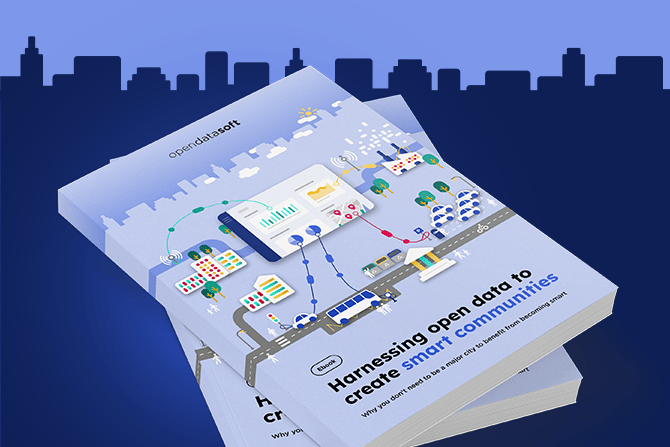5 key types of dataset for your municipality to share

To drive usage of your city or town’s data portal you need to publish information residents and visitors want to see, accessible in ways that best meet their needs. Based on analysis of our North American customers, we pinpoint the most popular datasets you should look to share.
By sharing data with citizens and other stakeholders municipalities and cities increase transparency, drive engagement and build trust. However, given the wide range of data these public bodies collect and produce, deciding which datasets to share first on their data portals can be difficult. They must understand the needs of stakeholders and then create compelling data experiences to deliver the right data, in the right format, to meet their requirements. Where should they start?
Luckily, cities can learn from their peers about what works for them and drives greatest engagement. While every data portal is different, analyzing usage across our North American clients reveals five key themes for open data sharing.
1. Permitting data
Evaluating and granting/refusing building permits makes up a large part of municipal workloads. It also generates significant interest from across the community – citizens want to find out the status of their applications and when they can expect a decision, while neighbors want to be kept informed about potential developments in their area. All of this results in significant inbound calls and emails to municipality planning departments to check on particular applications, adding to staff time.
That’s why permitting data is consistently the most popular dataset across different city and town data portals. By publishing up-to-date permitting information on their data portal, cities can ensure transparency for all and increase efficiency. For example, the Town of Cary North Carolina’s building permit data, detailing everything from solar panel applications to new building permits,contains over 80,000 records and has been downloaded more than 17,000 times. Accessible via a drill-down map it gives full details on what has been applied for and its current status, keeping citizens up-to-date on what is happening.

2. 311 data
To provide a central point for dealing with non-emergency requests, many cities and towns in North America have introduced 311 services where citizens can report issues via the phone, email and in many cases now through apps. These cover areas as diverse as reporting dumped items, potholes, graffiti or abandoned e-scooters.
Publishing an up to date list of 311 service requests (and their status) on data portals provides reassurance they have been received and are being dealt with, and demonstrates to citizens and local businesses that their calls and concerns matter. It also provides valuable information to local councilors, who can see what is happening in their district and the wider administration, which can analyze trends and launch targeted campaigns to prevent more significant problems developing.
The City of Long Beach in California has created its own 311 app (Go Long Beach), to make it as easy as possible to report incidents. Data is then available on its portal via interactive maps showing both the location and status of requests, holding the council to account for solving issues quickly and effectively.

3. Police and fire incident data
Citizens want to feel safe and reassured that police and fire services are protecting them. Equally, fire and police authorities want to demonstrate they are accountable and meeting high standards around areas such as response times. Sharing incident data is the perfect way to deliver on both these objectives, creating greater trust through transparency.
The City of Kingston in Canada worked closely with its fire department to publish up-to-date information via its Open Data Kingston portal. Not only does it visualize data through an interactive map, but it has also created a dashboard showing key metrics including average response times, average incident duration and the number of units dispatched. Filterable by date, it increases understanding of the fire department’s workload while holding them to account.

In a similar vein, the City of Salinas has created a data story covering public safety, featuring an anonymized heat map covering crimes in the area as well as highlighting parts of the city that are prone to flooding. This helps keep citizens informed and prepared in case of natural disasters.
4. Sustainability data
Citizens want to know their council is becoming more sustainable and committed to creating a positive environment for everyone to live in. Cities and municipalities can meet this need by using their data portals to report on everything from pollution levels and tree-planting programs to their own use of renewable energy.
As part of its sustainability program, the town of Morrisville in North Carolina published a data story showing the benefits of its solar power array, detailing the energy produced, savings in emissions and its positive impact on the environment.

5. Access to facilities
Citizens and visitors want to be able to easily find and use municipal facilities, whether parks, soccer fields, trails or cultural attractions. Delivering this information via interactive maps encourages people to visit them, with a corresponding increase in exercise and well-being.
Rather than just publish static information, Morrisville has gone further to avoid residents making wasted trips to its facilities. It uses flood and ground moisture sensors to trigger the automatic closure of soccer fields if they are too wet for play, with information automatically displayed on digital signs, its smart city dashboard, as well as emailed to players and coaches. And it has just launched a new app that brings together data on all of its facilities, including community events and whether sports courts are booked or free.
Jersey City has created an interactive map to show cultural attractions within the community, from the location of street art to where artists live. This helps drive greater involvement with the cultural life of the city by making it easy to find and interact with.

Of course, every community has different needs when it comes to open data. That’s why it is vital to involve everyone in your data program, Hold regular meetings with stakeholders, invite suggestions for new data to publish and understand which data is most popular, so you can provide more on the same theme. If you follow these guidelines, your data portal will become a go-to destination for citizens, businesses and developers, delivering greater engagement, transparency and efficiency.

How can you create a cost-effective, data-driven smart city? Download our new ebook and learn how harnessing open data can help municipalities create smarter communities: what is a smart city, how does it benefit municipalities and what holds back success? how can you cost-effectively build a smart city? best practice recommendations from industry experts: discover the 10 steps to becoming a smart city using open data examples of use case successes from our customers: Morrisville, Cary, Kingston, Jersey City, Southern Grampians, Western Parkland and Bristol.
 Data Trends
Data Trends
How successful are governments at sharing their data with citizens and businesses? The latest Open Data Maturity report provides an overview of progress across Europe, and highlights the importance of improving data portals and measuring impact to future success


